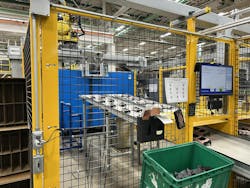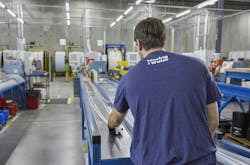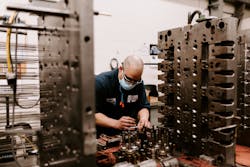Current workers provide base for manufacturers' future
By Karen Hanna
Career advancement is all in a day’s work at Hoffer Plastics, which recently marked the promotion to foreman of a worker bumped up from the shop floor. Meanwhile, all nine of the South Elgin, Ill., molding shop’s plant managers started in entry-level positions.
“Day 1, we’ll start maybe even subconsciously thinking about that person for future opportunities, observing where their strengths are, and exposing them to other areas of manufacturing, be it the automation that we have, or a quality role, for instance,” said Jeff Klabunde, VP of operations for the South Elgin, Ill., molding shop. “We start thinking about that on their first day.”
How companies handle promotions and professional development can go a long way toward easing challenges they might otherwise face filling job openings.
While employers might have once been able to rely on trade schools and a deep labor pool to fill roles ranging from entry-level to supervisory positions, human-resources (HR) experts say that’s no longer the case. In many instances, they have to grow their own.
“There should be some intentionality around building a future bench at all levels, and inviting people into that space,” said Julie Davis, VP of people strategy at the Association of Equipment Manufacturers (AEM). “And, then again, what does that mean? How are we going to develop them? How are we focusing on those soft skills that they need for leadership?”
What employers want
When it comes to identifying employees with potential, Hoffer Plastics executives repeat a phrase from “The Ideal Team Player,” a management book by Patrick Lencioni: Humble, hungry and smart. They’re not alone — John Babi, who in late November was promoted from director of operations for L&L Products to VP of Americas for the company — cites it, too. The refrain reflects the belief that having the right attitude often trumps having the right resume.
Based in Romeo, Mich., L&L Products combines expertise in both materials science and advanced engineering to create custom-engineered solutions that deliver reduced noise, vibration and harshness, as well as static sealing, acoustic improvement, structural reinforcement and substrate bonding for automotive, aerospace, commercial vehicle and other industrial applications. Many solutions integrate plastics as carriers for structural adhesives and static sealant materials.
But while the company’s offerings are high-tech, its professional opportunities aren’t limited to people with advanced degrees, Babi said.
“Some of these positions that we’ll fill in the office or other positions, they may have no background in the position. The aptitude is high, the attitude is great, the work ethic is amazing. We can teach manufacturing, we can teach purchasing, we can teach a lot of things,” he said. “The other things of hard work, being a good person, all that, your parents are supposed to do that.”
To help with that kind of conversation, extrusion processor Uponor, based in Apple Valley, Minn., has an annual talent review process, and employees are encouraged to have their own development plans. Like L&L Products — where about 70 percent of all jobs are filled internally — Uponor focuses on hiring from within.
The company, which manufactures pipes and other products, provides on-the-job training and special work assignments to allow employees to stretch their skills and pursue their interests.
“We encourage our employees to have individual development plans that state their goals and actions they and the company will take to help them increase their skills and certifications. The company has a generous tuition reimbursement program to help pay for the costs of additional education or certification expenses to support their career development,” said Jon Sillerud, VP for the extrusion processor’s integrated supply chain.
Scaffolding to move up
Training programs, tuition reimbursement and mentoring provide workers paths to developing their own careers.
Klabunde said Hoffer Plastics values people who are willing to help out without regard for the tasks delineated by their job description. It will make room for a candidate in its workforce of about 330, if he or she demonstrates a can-do attitude and a willingness to learn.
“If there isn’t a current open position, in some cases, we’ll create a position that can leverage that person’s skill to help them continue to grow and develop,” he said.
Career path
Filling vacancies internally is a priority that can pay off for companies, HR experts say.
In the war for talent, promotions and retention are a connected front.
“We start with retention, start with embracing the people that you already have. Developing your internal people is, again, a great way to identify future leaders, it’s a great way to retain people,” AEM’s Davis said.
Given the opportunity to gain skills and move up, employees will become versatile — and more loyal, said Bob Hersh, national managing principal of manufacturing for the New York and New England business advisory services of Grant Thornton. Hersh said it’s up to companies to know their employees well enough to understand the sort of opportunities that might appeal to them.
“What it comes down to is understanding what an individual employee really wants, because some people want to be that machine operator their entire career. They love it, they find it fulfilling, they want to do it, it’s a great career,” he said. “But a lot of people [think], ‘I want to run a machine, I want to run this machine or that machine, maybe I want to move materials, maybe I want to do some CNC coding.’ ”
At L&L Plastics, for example, the training and development manager created a series of five classes, ranging in length from a couple hours to 12 hours, to build employees’ leadership abilities. HR Director Jay Krawczyk said the company recently made the offerings available to its entire workforce of about 550 people, and another series is in the works.
Meanwhile, Hoffer Plastics offers training opportunities through Paulson Training Programs Inc., Chester, Conn., along with apprenticeships, mentoring and other professional-development options.
“We feel we can invest in their overall development as long as they present the desire to learn and really have the established work ethic,” HR Director Shari Nelson said. “That’s why we do have training systems in place to help support and guide those individuals that are more starting their career and interested in staying with Hoffer long-term.”
AEM’s Davis said mentoring and sponsorships can be especially helpful in building women’s confidence early in their careers in fields like manufacturing, where they’re underrepresented. But, as long as workers have advocates on the corporate ladder above them, the approach doesn’t have to be formal.
“Even things like job enlargement or offering employees additional projects to manage that might be growth opportunities to keep them stimulated and engaged and basically challenged, those are things that they can do,” she said.
More than just a job
In evaluating employees’ potential for new or higher positions, companies must take account of characteristics that might not be important in a worker’s current role. Depending on the position, traits like empathy and communication skills might prove more important on the next rung.
“Who’s got great conversational skills? Who is a leader who we would call a leader who’s not a leader?” Davis asked, referring to employees who, regardless of title, have earned their colleagues’ respect. “Every organization has those significant influencers in their workforce. Who are your influencers? Who do the other employees turn to?”
To manage others at L&L Products, workers have to show they have embraced the company’s values. That means demonstrating concern for others, honesty and integrity, along with other traits, Babi explained.
“Let’s make sure people who lead people are people leaders and not technical experts,” he said. “For these people leaders, what we’re looking for is that you actually genuinely at your core care.”
If they don’t, Babi and Krawczyk emphasized, they’re not a good fit for L&L Products.
Companies that fail to select for the right traits could be hurting both themselves and the employee they’ve promoted, according to Kathleen Quinn Votaw, CEO of TalenTrust, a strategic recruiting and human capital consulting firm that works with manufacturers.
“A leader has to have compassion, empathy, adhere to deadlines. There’s so many competencies that are involved with leadership. If you’ve got a good person, sometimes you might promote them to their level of incompetence. You might set them up for failure, if you don’t slow down, and, again, select for the leadership attributes,” Quinn Votaw said.
Failing to make a proper evaluation can be damaging, warned Mike Campanella, the president and CEO at Prevue HR Systems, a company that offers employment assessments.
He cautioned that companies can demoralize workers by dangling the possibility of promotion and then snatching it away.
“The last thing you want to do is go at somebody and say, ‘I want to consider you for a leadership role,’ and then find out … they won’t be right for that role, and then pass on them. … You don’t want to go to somebody and talk to them about promotion or leadership or growth, unless you’re sure that’s the path they should go in. Because then you put them down a path that just destroys their relationship with the organization by accident,” he said.
Getting their footing
The transition from being someone’s peer to becoming his or her boss can be a difficult one.
A proponent of employment assessments like those offered by Prevue, Quinn Votaw concedes the tests alone can’t predict success.
After all, an employee who performs one set of job duties well might not be appropriate for a position that demands a different set of skills.
“When you have somebody who might be the best production manager or line manager or worker, that doesn’t necessarily mean they’re going to be a good leader of people. Because it’s really easy to monitor your own work. It’s harder to be successful through other people,” Quinn Votaw said.
Krawczyk said his company’s employees have a rapport with each other that allows them to recognize one another’s strengths and weaknesses, and comfortably mentor each other.
But sometimes that means recognizing that the technical skills that might have led to a promotion at L&L Products aren’t enough to justify it.
“When we get to a place where maybe just the person is such a technical expert, and they can’t get there on the people side, then they no longer are a people manager,” he said.
To help its newest foreman, Klabunde said Hoffer Plastics will provide resources on dealing with issues like leadership conflict.
Stable tenure
Not every machine operator wants to be foreman, not every foreman wants to be plant manager. But for those who do, a company willing to make the opportunity available might be worth committing to for a long career.
“Leaders pay attention and look around and see who those high-potential, high-performing people are, and then do something about it,” Davis said. “At the end of the day, acknowledge the skills and attitudes that you see and people who you think, ‘Hey, that person has probably got what it takes to be advanced. How can I help sponsor that person? How can I encourage that person? How can I acknowledge that I see that person?’ It can literally be that easy.”
Hiring from within has proved an important retention tool for Uponor, Sillerud said.
“This helps provide career path opportunities for our current employees as a means of increasing employee retention, so they don’t need to go elsewhere to advance their career,” he said.
For Hoffer Plastics, where the longest-tenured employee has worked 53 years and the average stint is 20 years, the approach has piqued the interest of job candidates, while creating opportunities for employees.
Workers are in it for the long term. So is the company.
“Turnover costs quite a significant amount of money,” Nelson said. But building from within contains costs — and helps the company preserve its culture.
“So, it’s a win-win for everyone involved,” she said.
Contact:
Association of Equipment Manufacturers, Milwaukee, 414-272-0943, www.aem.org
Grant Thornton LLP, Boston, 617-723-7900, www.grantthornton.com
Prevue HR Systems Inc., Vancouver, British Columbia, 888-277-3883, www.prevuehr.com
TalenTrust, Denver, 303-838-3334, www.talentrust.com
About the Author
Karen Hanna
Senior Staff Reporter
Senior Staff Reporter Karen Hanna covers injection molding, molds and tooling, processors, workforce and other topics, and writes features including In Other Words and Problem Solved for Plastics Machinery & Manufacturing, Plastics Recycling and The Journal of Blow Molding. She has more than 15 years of experience in daily and magazine journalism.










